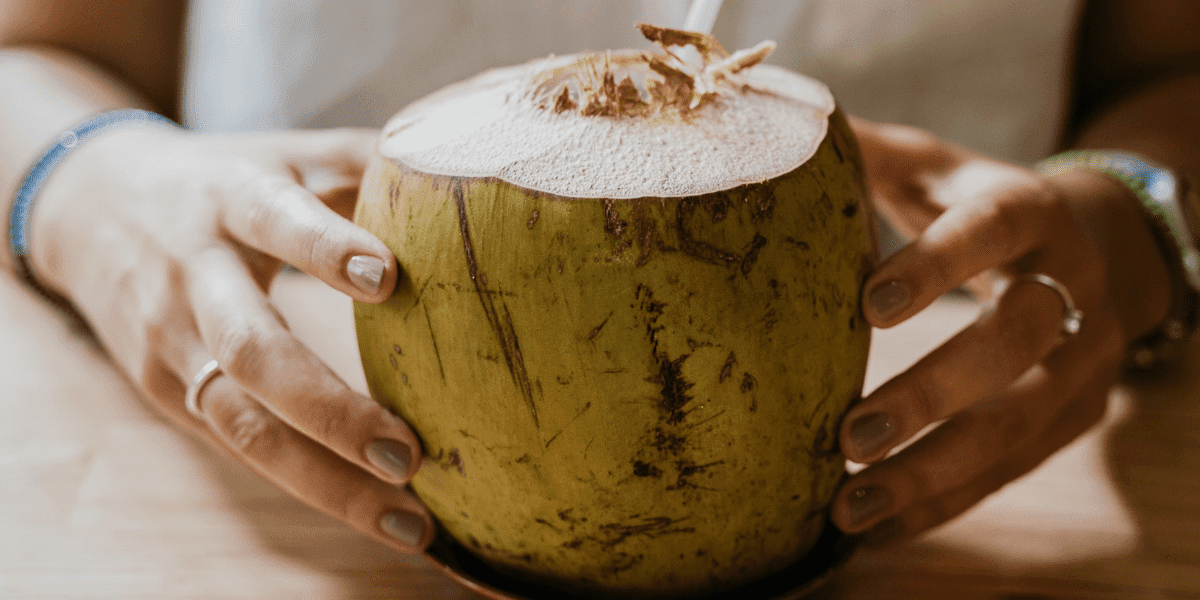Every mother is thrilled when she has her baby, and in their excitement, many mothers record every first, first tooth, first crawl, and first step. Motherhood indeed comes with many firsts, but breastfeeding is one of the most significant hurdles of this new hood.
Some women get it right by instinct, while some have to struggle and adjust to get the hang of it. It is no news that breastfeeding evokes and strengthens the bond between a mother and her baby that is almost impossible to duplicate, so every mother wants to do it right. Diet adjustments play a vital role in reducing the stress that comes with this phase, and this is why most moms pay close attention to their nutrition while breastfeeding their bundle of joy.
As an Amazon Associate, I earn from qualifying purchases. The links below maybe affiliate links. Please read my disclosure policy for more information.

Coconut water and coconut milk are excellent, healthy, and very nutritious beverages that every breastfeeding mother needs to incorporate into her diet.
If you have observed a dip in your milk supply, then you should try having these beverages. If you still have second thoughts, this article will clear your doubt and answer your questions about both drinks. So please sit back and watch it unfold.
What is Coconut Water?
Coconut water occurs in nature as a refreshing drink characterized by its delicious taste. It is a combination of carbohydrates that digest easily as electrolytes and simple sugars.
It is the uncolored liquid you find in a coconut’s center and is gotten out of the fruit when it is still young and green.
It has fewer calories, less sodium, and more potassium than most sports drinks, and even most unflavored coconut water boasts beneficial amounts of sugar, potassium, and sodium.
So coconut water presents an eminent way to give your taste buds a sweet treat and your body a good dose of nutrition.
Differences between Coconut Milk and Coconut Water

The coconut fruit is a large nut but a treasurable one because we can get a wide variety of finished goods obtained from his raw material. Two significant examples of such are coconut milk and coconut water.
These beverages might share the same source, but they both differ in:
Appearance
While coconut water is the natural, raw, translucent clear liquid found at the center of the coconut fruit, coconut milk is produced by grating the white flesh, adding some water, and squeezing out the creamy white liquid, similar to dairy milk.
Nutritional Profile
Their nutritional composition is also very different. Coconut milk has a higher calories content than coconut water, and the fat content in coconut milk is also very high compared to coconut water, which has less than 1 gram of fat.
But the contrast falters when you compare their vitamin and mineral properties. Coconut milk goes slightly above in Manganese and Folate content, but other than that, they are pretty similar.
Benefits of Coconut Water While Breastfeeding
Coconut water is generally known to be low in calories, but that is not all nursing mothers need to know about it. Other benefits include:

It is hydrating
Breastfeeding mothers may have a very generous supply of milk, causing breast engorgement or, on the other hand, low milk supply, leaving both mother and child frustrated during breastfeeding.
Breast milk is mainly made of water, so staying hydrated while breastfeeding is necessary because dehydration is a principal cause of a low milk supply.
Coconut water is mostly water and electrolytes which makes it an excellent drink for hydration. It could take a few hours or sometimes days for you to see changes, but you will definitely notice an increase in your milk supply when you start taking coconut water while breastfeeding.
It supports overall health
Coconut products generally are rich in immunity-boosting properties because they contain antimicrobial acids and antioxidants.
It aids digestion
Coconut water contains gut health-promoting enzymes and amino acids, such as Lauric Acid, which can help with digestion.
It helps to control weight gain
Many breastfeeding mothers are usually diet-conscious because they want to eat enough to help their baby grow but not too much. After all, we don’t want to add any extra kilos.
Coconut water is only slightly sweet and is exceptionally low in terms of calories. So you don’t have to be afraid about it spiking your body weight.
How much coconut water should you take in a day?
Now that we know the benefits of having coconut water, there is a tendency to want to drink 20 liters daily, but it is necessary to keep a close check on how much you consume daily to increase your milk supply.
Although there is no scarce scientific data on the amount of coconut water you should drink every day, nutritionists suggest you take one tender coconut per day.
You should always consume your coconut water immediately after the nut is broken because otherwise, the water may become sour and have a pungent smell.
If you cannot stand its dull taste, you can try to be a bit flexible. So instead of drinking it naturally from the fruit, you can make a lactation smoothie and add some coconut water or bake lactation treats using coconut water.
You could even supplement it with fruit juices. You can also get some drinks like body armor Lyte with added coconut water. Just make sure to choose a brand that is organic and cold-pressed.
Whichever way you decide to sneak it into your diet, however, you like to maximize its benefits. But try not to over-consume because excessive intake may lead to hyperkalemia.
What is coconut milk?
Unlike coconut water, this beverage is not harvested directly from the coconut. It is obtained from the flesh of the brown coconut, which would then be shredded, simmered in plain water or coconut water, and then allowed to soak.
When the water entirely absorbs the flavor, it is strained. The coconut and the white are usually separated, and the resulting opaque, white fluid is set aside.
Coconut milk has a high caloric and fat content. These calories are usually gotten from saturated fat. Even so, it can be used as a plant-based substitute for dairy in cereals, coffee, and even pastries.
It is one of the healthiest and nutritious alternatives for fat, and it will give your food a distinct, nutty flavor. This by-product of a mature coconut’s flesh is commonly used as a cow’s milk replacement.
So, coconut milk is a rich alternative to dairy milk for any breastfeeding mom who needs to go dairy-free.
Benefits of Coconut Milk in Breastfeeding
Coconut is from a distinct food group composed of good saturated fats called medium-chain fatty acids, just like breast milk.
This qualifies coconut milk as a vibrant, rich drink with excellent health and healing benefits that will help breastfeeding mothers in many ways. We will highlight a few benefits of coconut milk in breastfeeding below.
It helps to increase the milk supply
Coconut milk, in many ways, helps to increase milk supply, one of which is by improving nutrition to help release the necessary hormones for milk production.
It also does this by supplying the mother with the essential fatty acids, usually present in breast milk. These essential fatty acids help breastfeeding mothers produce more nutritious breast milk.
It is the healthiest substitute for fat
Coconut milk contains a healthy fat called Monolaurin. This healthy fat helps to speed up and aid the growth of brain cells and also helps to lower the severity of the impact of other behavioral issues associated with breastfeeding.
It is derived from plants and does not contain lactose so it is a good substitute and perfect choice for lactose intolerant and vegan mothers.
It promotes weight maintenance
Coconut milk helps in weight maintenance for mothers looking for a way to gain weight or maintain a healthy BMI because its calorie content is high, especially in comparison with coconut milk.
It helps to lower blood pressure
Coconut milk is well known for its aptness to increase good cholesterol levels, which helps to lower blood pressure. It also contains some minerals that help control blood flow and increase the circulation of blood.

It aids digestion
Coconut milk also helps to aid digestion just like coconut water and helps to relieve constipation.
It helps to prevent fatigue
It has a good amount of electrolytes which helps to prevent fatigue and tiredness in breastfeeding mothers.
Conclusion
When coconut water is compared with coconut milk, there is absolutely no doubt that they are very different. While one is very rich in fat content and calories, the other is mostly water.
So conclusively, we cannot say which one is healthier because that would depend significantly on your purpose for consumption. For those trying to lose weight, coconut water is more beneficial, and for those who wish to maintain a healthy weight, coconut milk would be more nutritious.
Coconut milk is a healthier alternative to other fat sources, and coconut water is a hydration drink. So it is your purpose and not their properties that make either of these two the healthier option. What is paramount is that you drink up for your baby to grow up healthy and keep you strong.


